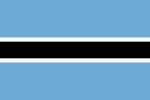This article needs additional citations for verification. (February 2016) |
| Part of a series on the |
| Culture of Botswana |
|---|
 |
| People |
| Languages |
| Cuisine |
| Religion |
| Art |
| Literature |
| Music |
| Sport |



Besides referring to the language of the dominant people groups in Botswana, Setswana is the adjective used to describe the rich cultural traditions of the Batswana - whether construed as members of the Setswana ethnic groups or of all citizens of Botswana.[citation needed] the Batswana believe in the rich culture of Botho-Ubuntu, "People are not individuals, living in a state of independence, but part of a community, living in relationships and interdependence."[1] Batswana believe in working together and in being united.
The name Batswana is used as a nationality for the people of Botswana and as an ethnicity for people who practice the same culture and speak the same language in neighbouring South Africa. There are different ethnic groups in the country of Botswana, among them are the Tswana (Barolong, Bakwena, Bangwato, Batlokwa, Bakgatla, Baphuthing, Bataung, Bangwaketse, Batawana, Bahurutshe, Balete); BaKalanga (BaLilima, Baperi, BaWumbe, BaNambya); Ovaherero (Baherero, Ovambanderu); Wayei, Bambukushu; Veekuhane (Basubiya in Setswana); Khoe & San groups; Batswapong and Batshweneng.[2] All these tribes believe in different customs; however, because of living together and inter-marrying for more than a century, they have now developed some similarities, which are seen in the changing or developing languages in the country as well as shared cultures. The languages differ significantly from one area to another or by the ethnic dialects but they are all regarded as Botswana languages. Some Tswana people are based in the Northwest Province of the Republic of South Africa, and Botswana.
- ^ Turaki, Y.: 2006, Foundations of African Traditional Religion and Worldview (Word Alive Publishers, Nairobi).
- ^ "Culture & History | Embassy of Botswana, Japan". www.botswanaembassy.or.jp. Retrieved 2021-05-23.